 |
| Tata Sons' Ratan Tata: No respite at
the top |
RATAN TATA
Busy Retirement
Seeing through TCS' IPO and finding a
successor are just two of his post-retirement tasks.
Usually, when corporate
chieftains retire, they either look for a sinecure or the more creative
ones pen their memoirs. Nothing of that sort will happen with Tata
Group head honcho, Ratan Tata. For two reasons: One, he isn't just
any other corporate chieftain. Two, he isn't retiring yet. Sure,
on December 28 last year, Tata turned 65 and in accordance with
the group's policy, he retired. So, while Tata retired as the Executive
Chairman of Tata Sons, the group's holding company, he continues
as its non-executive Chairman and will, therefore, continue to be
the Tata Group's moving force for the next five years.
Meanwhile, he has a busy year to look forward
to. Tata Consultancy Services, the IT services division of Tata
Sons, should launch its much-awaited IPO. The stockmarket has been
buzzing with excitement for more than 18 months now. And understandably
so. TCS is the largest it services company in the country, and some
analysts expect it to be valued at Rs 60,000 crore when it lists
this year. So 2003 may be the year when Tata unlocks value for shareholders
of Tata Sons, and hopefully pulls some small investors back into
the primary market.
TCS IPO apart, Tata has a more pressing job
at hand. He must start the process of identifying, selecting, and
grooming a successor to his post. As he told BT early last year,
he will step down from chairmanship in end 2007, and a successor
will be "identified and designated a couple of years before
I leave''. For obvious reasons, corporate India's biggest succession
story will be keenly tracked by one and all.
-R. Sridharan
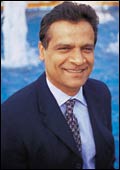 |
| Scandent's Vangal: IT's it |
RAMESH VANGAL
Future-Scan
Ramesh Vangal is betting that he isn't
late to the IT party.
He has run beverage
companies-Pepsi's Indian operations and Seagram's Asia-Pacific ones-founded
a venture capital firm (At India LLC), even sold soap for Procter
& Gamble. Now, 47-year-old Ramesh Vangal wants a piece of the
Indian it pie. Put it down to his experiences on the board of software
blue chip Infosys Technologies between 1997 and 2001. So, Vangal's
Scandent Group, founded in November 2001, with help from Vivendi
Vice Chairman Edgar Bronfman Jr and former Pepsi Chairman and CEO
Christopher Sinclair, is trying to vend solutions in infrastructure
and application management, engineering consultancy, and embedded
cad services. ''It is never too late,'' says Vangal. ''We are not
a me-too company.''
-Venkatesha Babu
 |
| Electrolux CEO-designate Karwal: He must
like red |
RAJEEV KARWAL
Third Time Lucky?
Can marketing whiz Rajeev Karwal work
his magic at Electrolux?
Enough and more
has been written about Rajeev Karwal's career. The MBA at IMT Ghaziabad,
a second-rung B-school, the sales and marketing successes at Onida,
the Chellaram group (in the Canary Islands and it was in consumer
durable retailing), and lg. The exclusion of Philips from that sentence
is deliberate. True, between December 1999, when Karwal signed on
as Senior VP, Consumer Electronics-he was given a mandate to turn
the business around-and September 2002, Philips improved its marketshare
in audio systems from 27.8 per cent to 43.5 per cent and CTV sets
from 3.6 per cent to 6.6 per cent. The company is also likely to
show a profit for this year (Rs 50 crore). That's some achievement,
but for a man who cut his teeth selling TV sets, Karwal's stint
doesn't seem to have done all that much for Philips TVS. So, can
the man turn around the fortunes of Electrolux Kelvinator when he
takes over as its CEO on February 1? Well, Rs 422 crore of accumulated
losses and an unwieldy four-brand portfolio isn't exactly the best
of legacies. But Karwal says he has a plan. Watch this space.
-Suveen K. Sinha
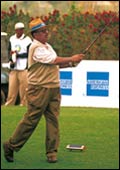 |
| JWT India's Oberoi: He'll tee off in
April |
KAMAL OBEROI
Life After Mike
Come April and Oberoi will take over
as CEO of JWT India.
It isn't easy replacing
a legend, but that's what 47-year-old Kamal Oberoi will do when
he takes over from JWT India ceo-of-18-years Mike Khanna. Oberoi
is seen more as a number-cruncher than a typical advertising type.
With O&M India having appropriated the mantle of creativity,
Oberoi has his task cut out. "The greatest challenge for me
is to create an environment of freedom, freedom to fail," he
says. That'd be a start.
-Shailesh Dobhal
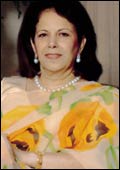 |
| Jumbo's Chhabria: Managing conflict |
VIDYA CHHABRIA
Mother Liquor
Can Ms Chhabria keep it all together
in 2003?
When Vidya Chhabria-she
comes in at #44 in Fortune's listing of the most powerful women
in business outside the US-succeeded her late husband Manohar Chhabria
as the Chairperson of the $2-billion (Rs 9,600 crore) Jumbo Group,
her ambitious daughters were relegated to the background. The eldest,
Bhavika Godhwani, couldn't stomach the fact that the second, Komal
Wazir, was positioning herself as the inheritor of their father's
leadership legacy. But the squabbling sisters quietened down when
Vidya Chhabria took over-youngest daughter Kiran keeps a low profile
and manages the group's corporate communications from Dubai. In
the last days of his life, Chhabria mended his fences with estranged
brother Kishore. Now, it remains to be seen whether, in the tradition
of the best Bollywood pot-boilers Manu Chhabria adored, the widow
and the brother get together to give it to UB. Or, will sibling
rivalry crack an empire that has seen better days? Only Vidya Chhabria
can tell and the lady is willing to speak only about her energy
and consulting businesses.
-Moinak Mitra
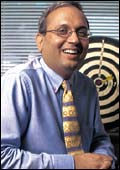 |
| Alliance's Arora: Time to buy |
SAMIR ARORA
From Manager To Owner
Alliance Capital's Samir Arora is attempting
a MBO.
It is one of the
top three mutual funds in the company and its composition and performance
is widely perceived to be a manifestation of the personality of
the man who runs it. So, when Alliance decided to sell its mutual
fund in India-it manages around Rs 3,600 crore of assets-it was
only apt that its Singapore-based CIO, Emerging Markets, Samir Arora,
put in a bid for it. Wait till mid-January for the shortlist.
-Shilpa Nayak
M. DAMODARAN
Redemption Song
UTI's Chairman has to still fight fires.
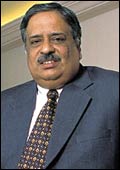 |
| UTI's Damodaran: A May test |
For some 18 months
55-year-old Meleveetil Damodaran, a career bureaucrat has been chief
firefighter (he is designated Chairman) at India's largest mutual
fund company, Unit Trust of India (UTI). To give the man his due,
he has brought about changes in the way the Trust manages its funds,
in investor communication, and in marketing. That's some achievement
given the timing of his appointment-in the wake of a crisis that
almost forced the Trust to freeze transactions on us-64. But on
May 31, 2003, Damodaran will face his toughest test yet. That's
the day the government's guaranteed repurchase of up to 5,000 units
of us-64 for Rs 12 comes to an end.
With a current Net Asset Value of Rs 6.26,
it is inconceivable that investors will choose to stay invested
in the fund. That could see a run on the us-64, even wipe out its
capital.
-Roshni Jayakar
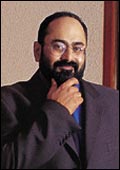 |
| BPL's Chandrasekhar: Fighting on all
fronts |
RAJEEV CHANDRASEKHAR
The Cookie Crumbles
BPL Communications' CEO must be hoping
for a better 2003.
In january 2002,
former Intel employee and CEO of BPL Communications, Rajeev Chandrasekhar,
was on top of the world: the merger with the Birla-Tata-at&t
combine seemed set to go through with BPL emerging the single largest
shareholder and he himself looked a shoo-in for the CEO's post.
But litigation with BPL's shareholders delayed the merger and the
combine (now called Idea) seems to have lost interest. So Chandrasekhar
is left to nurse four cellular circles, 1.1 million subscribers,
and Rs 1,400 crore in debt. As Chairman of the Cellular Operators
Association of India, Chandrasekhar must be hoping the Telecom Dispute
Settlement Appellate Tribunal creates a level playing field in telecom-it
is currently skewed in favour of basic telephony companies. And
that the merger goes through.
-Suveen K. Sinha
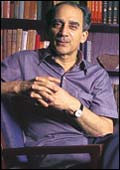 |
| Disinvestment Minister Shourie: Rock
solid |
ARUN SHOURIE
Mr Persistence
Shourie wants to privatise. Can he?
After several
setbacks-including opposition from several of his Cabinet colleagues-the
Union Disinvestment Minister had finally managed to get the disinvestment
process back on track by 2002-end. The new year will bring with
it a fresh set of challenges and the same old opponents. Shourie
is ready for them all.
-Ashish Gupta
 |
| Barista's Deol: Enjoying his cuppa |
RAVI DEOL
Coffeemaker To The World?
Ravi Deol wants to take Barista global.
Fine, Ravi Deol
made Barista one of India's fastest growing brands-and its fastest
growing coffee chain-in 2002, but that is not why he figures here.
Deol's sights are now set on a global presence for the chain. In
2002, he roped in Yogesh Samat as Chief Operating Officer (coo);
Samat will focus on the Indian ops, leaving Deol free to realise
his global ambitions for the chain. On December 19, 2002, Barista
took its first tentative step towards becoming a global chain by
opening an outlet in Colombo, Sri Lanka. Next stop: Dubai, and then,
Europe. "We created the largest speciality coffee chain in
South Asia in two years," gushes the former CibaGeigy, Wipro
Lighting, and Coca-Cola India exec. "Now we are ready to roll
into larger and more evolved geographies."
-Abha Bakaya
|

